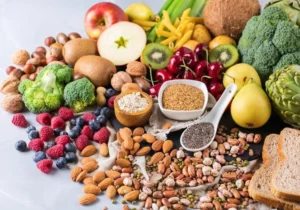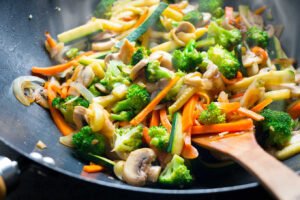
Your Comprehensive Guide on Vegetarian Diet for Weight Loss and Better Health

Adopting a vegetarian diet can be an effective way for weight loss and improve general health in a society where obesity rates are skyrocketing and lifestyle-related diseases are on the rise. The avoidance of meat and fish in favor of plant-based foods is what distinguishes a vegetarian diet.
Table of Contents
Introduction
This article will look at the advantages of a vegetarian diet, the science underlying a vegetarian diet for weight loss, and practical recommendations for effectively transitioning to and maintaining a vegetarian lifestyle.

Understanding Vegetarianism
Let us get deeper into vegetarianism with some crucial insights.

What is a Vegetarian Diet?
A vegetarian diet is a dietary pattern that emphasizes plant-based meals while excluding meat and fish. It promotes eating fruits and vegetables, whole grains, legumes, nuts, and seeds. Ethical, environmental, health-related, or cultural considerations may be the driving force behind this dietary choice.
A well-planned vegetarian diet can provide a plethora of nutritional elements. To preserve excellent health, however, it is critical to ensure that all dietary demands are addressed. Vegetarians of various categories have different eating preferences:
Lacto-Ovo Vegetarians: This group consumes dairy products and eggs. They can eat a variety of foods, including milk, cheese, yogurt, and eggs, which provide high-quality protein and important nutrients.
Lacto Vegetarians: Lacto vegetarians consume dairy products but do not ingest eggs. They must find substitutes for the protein and critical elements contained in eggs.
Ovo Vegetarians: Ovo vegetarians eat eggs but do not drink dairy products. They must find alternatives to dairy for calcium, vitamin D, and other minerals.
Vegans: Vegans abstain from all animal products, including meat, dairy, eggs, and even honey. They must be especially cautious with their diet to ensure that they meet all nutrient requirements without consuming animal-derived items.
Nutritional Factors to Consider
One of the most common concerns about a vegetarian diet for weight loss is its nutritional value. A vegetarian diet can meet all nutritional requirements when properly designed.
Protein: Legumes (beans, lentils, and chickpeas), tofu, tempeh, seitan, edamame, quinoa, nuts, and seeds are all plant-based protein sources. Using a variety of protein sources throughout the day ensures a balanced amino acid composition.
Iron: Spinach, lentils, chickpeas, fortified cereals, tofu, pumpkin seeds, and quinoa are all plant-based iron sources. Iron absorption is increased when iron-rich foods are combined with vitamin C-rich foods, such as citrus fruits or bell peppers.
Calcium: Plant-based calcium sources include fortified plant milk, tofu, leafy greens (kale, collard greens, bok choy), and almonds. For vegans, fortified foods might be a great way to maintain appropriate calcium consumption.
Vitamin B12: Because vitamin B12 is found predominantly in animal sources, vegetarians and vegans must receive it through fortified foods (such as fortified plant milk or cereals) or by taking B12 supplements.
Omega-3 Fatty Acids: Flaxseeds, chia seeds, walnuts, and hemp seeds are plant-based sources of omega-3 fatty acids. These items can help maintain a healthy omega-3-to-omega-6 ratio in the diet.
Vitamin D: You can get vitamin D through the sun, fortified plant milk, orange juice, or cereals. Vitamin D supplements may be recommended in some circumstances, particularly for those who get little sun.
Zinc: Zinc sources from plants include legumes, nuts, seeds, whole grains, and fortified cereals. Zinc requirements can be met by eating a variety of these foods.
Vegetarians can meet their nutritional demands and maintain maximum health by balancing their diet with a varied variety of nutrient-dense foods and considering appropriate supplementation. A licensed dietician with experience in plant-based eating can also help with a healthy vegetarian plan for weight loss.
Vegetarian Diet and Weight Loss

Let us understand the relationship between vegetarianism and weight loss.
Numerous studies have found that eating a vegetarian diet is associated with lower BMIs and a lower risk of obesity. This connection is influenced by several factors, including:
Lower Calorie Density: Plant-based foods have a lower calorie density than animal-based diets. Fruits, vegetables, legumes, and whole grains are high in fiber, water, and nutrients, making them full while containing fewer calories.
More Fiber: Focus on fiber-rich food items if you want to lose weight on a vegetarian diet. Vegetarian diets are often high in dietary fiber, which improves feelings of fullness and satiety, which further helps to lower overall calorie intake and decrease harmful snacking habits.
Reduced Consumption of Unhealthy Fats: Meat and animal products are frequently higher in saturated and trans fats, both of which are linked to weight gain and heart disease. Vegetarians naturally limit their consumption of harmful fats by avoiding these items.
Increased Physical Activity: According to some research, vegetarians engage in more physical activity than non-vegetarians, which can help with weight control and overall well-being.
Mechanisms Behind Weight Loss Through a Vegetarian Diet
Several physiological factors may account for the weight loss benefits found in vegetarians:
Resting Metabolic Rate (RMR): According to research, a healthy vegetarian plan for weight loss may enhance RMR or the number of calories burned during rest. This metabolic advantage can help you lose weight over time.
Increased Fat Oxidation: Vegetarians may have higher fat oxidation rates, which means their bodies burn fat more efficiently for energy. This can result in a reduction in body fat and, subsequently, help you lose weight with a vegetarian diet.
Increased Insulin Sensitivity: Eating a vegetarian diet has been linked to increased insulin sensitivity, which makes the body’s cells more receptive to insulin. Increased insulin sensitivity can help manage blood sugar levels and minimize the likelihood of fat storage.
Gut Microbiota: New research reveals that vegetarian diets for weight loss have a good impact on gut microbiota, supporting a more diversified and beneficial microbial ecology. A healthy gut microbiome is linked to a better metabolism and less inflammation, which may help with weight loss.
Regular physical exercise, staying hydrated, and adopting mindful eating practices can all help with weight loss on a vegetarian diet.
Note: There might be affiliate links mentioned here. We may receive a commission if you purchase a product through an affiliate link. There is no additional charge for you. Please do your own research before making any online purchases.
Here are some recipes and guidebooks to know more about Vegetarian Diet for Weight Loss:
Health Advantages of a Vegetarian Diet
A vegetarian diet has several health advantages. Refer to the points below for details.

Cardiovascular Health
A well-planned, healthy vegetarian plan for weight loss can provide significant heart-health benefits. Vegetarians consume less saturated fat and dietary cholesterol by avoiding meat and high-cholesterol animal products, both of which are risk factors for heart disease. Instead, they concentrate on heart-healthy foods such as:
Fruits and Vegetables: Fruits and vegetables, which are high in antioxidants, vitamins, and minerals, promote heart health by lowering oxidative stress and inflammation, encouraging healthy blood pressure, and supporting blood vessel function.
Whole Grains: Whole grains, such as oats, quinoa, brown rice, and whole wheat, are high in fiber, which can help decrease cholesterol and enhance heart health.
Nuts and Seeds: Nuts and seeds, including almonds, walnuts, chia seeds, and flaxseeds, are high in unsaturated fats like omega-3 fatty acids. These fats have been demonstrated to lower LDL cholesterol levels and thereby minimize the risk of heart disease.
Legumes: Legumes are high in soluble fiber and protein, which can help decrease LDL cholesterol and enhance overall heart health.
Healthy Fats: Vegetarians frequently substitute healthier fat sources such as olive oil and avocado for saturated fats found in animal products.
A vegetarian diet for weight loss that includes these heart-healthy foods can help minimize the risk of heart disease and improve overall cardiovascular health.
Diabetes Management

Individuals with diabetes or those at risk of acquiring type 2 diabetes may benefit from a vegetarian diet for weight loss. Plant-based diets have been linked to higher insulin sensitivity and glycemic control. The following are important aspects that contribute to these advantages:
Fiber: The high fiber content of plant-based foods delays the absorption of sugars and carbs, which leads to controlled blood sugar.
Glycemic Load: A vegetarian diet has a lower glycemic load, which means it causes less of a spike in blood sugar levels after eating. This is because plant-based diets are high in low-glycemic-index foods.
Healthy Weight Management: As previously mentioned, vegetarian diets can help with weight loss or management, which is important for diabetes treatment.
Cancer Prevention

While a vegetarian diet is not a cure for cancer, it may lessen the risk of certain types of cancer. Antioxidants and phytochemicals, which are plentiful in plant-based foods, help prevent cancer by neutralizing free radicals and promoting cellular health. Specific vegetarian diet components associated with cancer risk reduction include:
Cruciferous Vegetables: Broccoli, cauliflower, kale, and cabbage all contain anticancer chemicals.
Berries: Antioxidants found in blueberries, strawberries, and raspberries may help protect against cancer.
Legumes: Phytoestrogens found in soybeans and other legumes may protect against hormone-related malignancies.
Colorful Fruits and Vegetables: Eating a variety of colorful fruits and vegetables provides a wide spectrum of antioxidants and phytochemicals.
It’s important to remember that cancer prevention is multifaceted, and a vegetarian diet should be part of a healthy lifestyle that includes regular exercise, abstaining from tobacco and excessive alcohol consumption, and maintaining a healthy weight.
Better Digestion

Because of its high fiber content, a vegetarian diet might aid digestion. Fiber promotes regular bowel motions and helps prevent constipation. Furthermore, eating fruits, vegetables, and whole grains contains prebiotics, which aid in the formation of good intestinal bacteria. A healthy gut microbiome has been linked to better digestive health and a lower incidence of gastrointestinal problems.
Tips for Adopting a Vegetarian Lifestyle
If you want to adapt to a vegetarian lifestyle effectively, refer to the following tips:
- Gradual Change
It’s frequently preferable to ease into vegetarianism for people who are new to it. This method allows the palate and digestive system to adjust to new foods while preventing feelings of being overwhelmed. Begin by introducing more plant-based dishes into your diet while gradually decreasing your meat consumption.
- Variety and Balance
A healthy vegetarian plan for weight loss includes a wide variety of plant-based food items. Individuals can ensure they get a variety of critical nutrients by integrating fruits, vegetables, whole grains, legumes, nuts, and seeds into their meals.
- High Protein Foods
Plant-based protein sources are plentiful and diverse. Beans, lentils, and chickpeas are great meat substitutes, as are tofu, tempeh, seitan, quinoa, and plant-based protein powders. Using a variety of protein sources throughout the day ensures a balanced amino acid composition and aids your efforts to lose weight with a vegetarian diet.
- Sources of Iron and Vitamin B12
Individuals can maintain proper iron levels by eating iron-rich plant-based foods such as lentils, beans, tofu, fortified cereals, and spinach. Combining these foods with those high in vitamin C improves iron absorption. If you’re looking for vitamin B12, try fortified foods like plant milk or cereals, or follow a doctor’s advice and take B12 supplements.
- Meal Preparation and Planning
Meal planning and preparation might make the transition to a vegetarian lifestyle easier. Meal planning helps guarantee a balanced diet and prevents impulsive, unhealthy food choices. It also saves time and effort on hectic days, making it easier to stick to the healthy vegetarian plan for weight loss.
FAQs
What types of vegetarians are there, and what do they eat?
There are four varieties of vegetarians: Lacto-Ovo vegetarians (eat dairy and eggs), Lacto vegetarians (eat dairy but not eggs), Ovo vegetarians (eat eggs but not dairy), and Vegans (eat no animal products at all). Lacto-Ovo vegetarians can eat dairy and eggs; lacto vegetarians eat dairy but not eggs; Ovo vegetarians eat eggs but not dairy; and vegans forgo all animal-derived foods.
Can a vegetarian diet provide all of the necessary nutrients?
Yes, a well-planned vegetarian diet may supply all the necessary nutrients. Plant-based sources of protein, iron, calcium, and vitamin B12 include beans, tofu, nuts, seeds, and fortified meals. Including a variety of fruits and vegetables ensures that you are getting a full range of vitamins and minerals.
How can vegans achieve an adequate protein intake?
Vegetarians can receive enough protein from legumes (beans, lentils, and chickpeas), tofu, tempeh, seitan, quinoa, nuts, and seeds. Using a variety of protein sources throughout the day ensures a balanced amino acid composition.
What are some decent iron sources for vegetarians?
Iron can be found in vegetarian foods such as spinach, lentils, chickpeas, fortified cereals, tofu, pumpkin seeds, and quinoa. Iron absorption is increased when iron-rich foods are combined with vitamin C-rich foods, such as citrus fruits or bell peppers.
Without dairy, how can vegetarians obtain adequate calcium?
Calcium-fortified plant milk, tofu, leafy greens (kale, collard greens, and bok choy), and almonds are all plant-based calcium sources. For vegans, fortified foods are an excellent way to maintain adequate calcium consumption.
Is B12 a problem for vegetarians?
Yes, the majority of vitamin B12 is found in animal sources. Vegans and vegetarians can obtain B12 by consuming fortified foods like cereals or plant milk, or they can take B12 supplements on a doctor’s advice.
Can a vegetarian diet help you lose weight?
Yes, eating a well-balanced vegetarian diet can help you lose weight. Plant-based foods’ lower calorie density and higher fiber content contribute to increased satiety and lower overall calorie intake.
What role does a vegetarian diet play in heart health?
A vegetarian diet improves heart health by lowering the amount of saturated fat and cholesterol consumed from animal sources. Instead, it focuses on heart-healthy foods such as fruits and vegetables, whole grains, nuts, and seeds.
Can a vegetarian diet help with diabetes management?
Yes, a vegetarian diet can help with diabetes management. The high fiber content regulates blood sugar levels, and foods with a lower glycemic load prevent blood sugar spikes.
Is a vegetarian diet associated with a lower risk of cancer?
A vegetarian diet may lessen the incidence of certain cancers, but it is not a cure. Plant-based diets’ high levels of antioxidants and phytochemicals may help prevent cancer.
Conclusion
A well-planned vegetarian diet provides various health benefits, including weight loss, improved heart health, better diabetes management, and maybe lower cancer risks. Individuals can live on a vegetarian diet while enjoying delicious and healthy meals by embracing a varied selection of nutrient-dense plant-based foods and being conscious of covering all nutritional demands.
Switching to a vegetarian diet can be a significant step toward better health and general well-being. Before making significant dietary changes, visit a healthcare practitioner or qualified nutritionist to verify that the vegetarian diet is tailored to your unique needs and taste
Disclaimer: The information provided in this article is for educational purposes only and should not be considered as a substitute for medical advice. Consult a healthcare professional before implementing any home remedies or making significant changes to your lifestyle.






